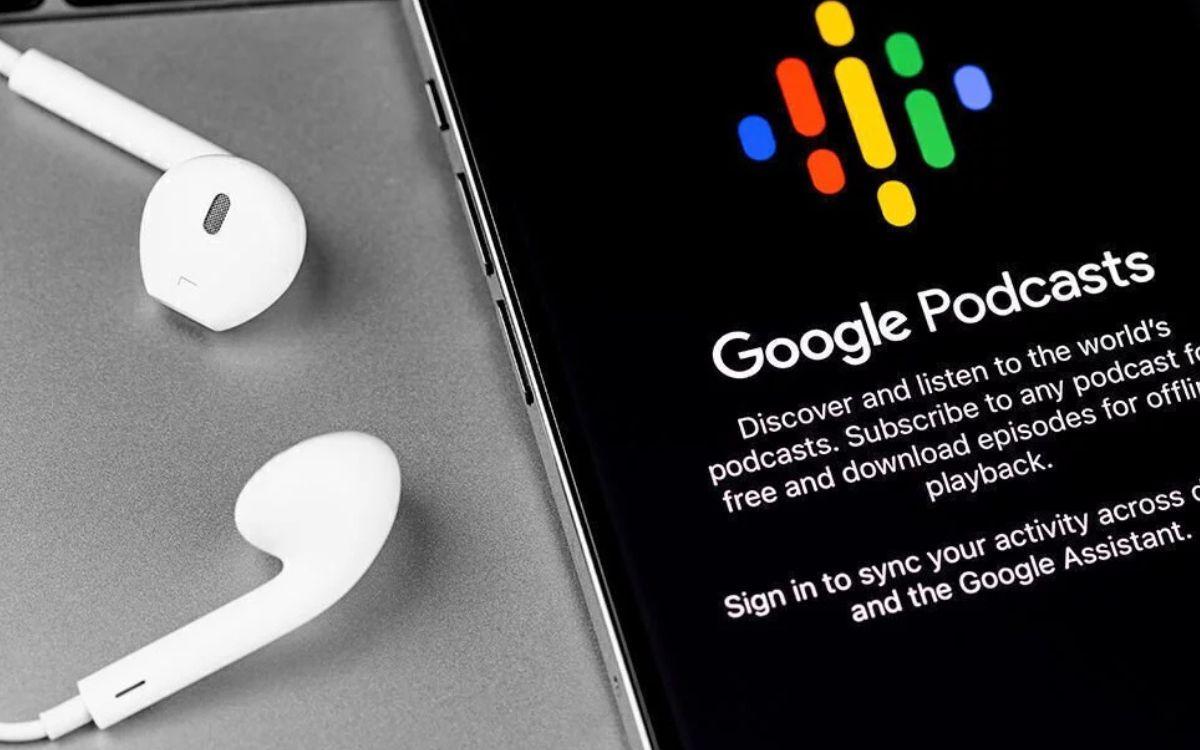Home>Events & Info>Podcast>How To Promote Podcast On Social Media


Podcast
How To Promote Podcast On Social Media
Modified: January 22, 2024
Learn how to effectively promote your podcast on social media platforms and increase your reach. Discover tips and strategies to maximize engagement and grow your podcast audience.
(Many of the links in this article redirect to a specific reviewed product. Your purchase of these products through affiliate links helps to generate commission for AudioLover.com, at no extra cost. Learn more)
Table of Contents
- Introduction
- Understanding Social Media Promotion
- Setting Up Your Podcast’s Social Media Profiles
- Creating Engaging Content for Social Media
- Leveraging Hashtags and Keywords
- Collaborating with Influencers and Guest Posting
- Utilizing Paid Advertising on Social Media
- Cross-Promoting with Other Podcasts or Brands
- Engaging with Your Audience on Social Media
- Tracking and Analyzing Results
- Conclusion
Introduction
Podcasts have become increasingly popular platforms for sharing information, entertainment, and stories. With millions of podcasts available on various topics, it’s essential to stand out from the crowd and attract listeners to your show. One of the most effective ways to promote your podcast and reach a wider audience is through social media.
Social media platforms like Facebook, Twitter, Instagram, and LinkedIn offer a plethora of opportunities to engage with your target audience, generate buzz, and drive traffic to your podcast episodes. However, strategic planning and execution are key to ensuring your efforts yield the desired results.
In this article, we will delve into the world of social media promotion for podcasts and provide you with practical tips and strategies to effectively promote your podcast on these platforms. From setting up your podcast’s social media profiles to creating engaging content, leveraging hashtags, collaborating with influencers, and tracking your results, we’ve got you covered.
Whether you’re a seasoned podcaster looking to expand your reach or a newbie just starting out, this article will equip you with the tools and knowledge to confidently promote your podcast on social media. Let’s dive in!
Understanding Social Media Promotion
Social media promotion involves using social media platforms to increase the visibility and reach of your podcast. It allows you to connect with your target audience, build relationships, and generate interest in your podcast episodes. Understanding the fundamentals of social media promotion is crucial for creating an effective strategy.
First and foremost, it’s important to know your target audience and choose the social media platforms they are most active on. Each platform has its own unique features, demographics, and user behavior. For instance, Instagram is a visual platform that appeals to a younger audience, while LinkedIn is more professional and caters to a business-oriented demographic.
Once you have identified the platforms that align with your target audience, focus on creating consistent and compelling content. Your social media posts should reflect the tone and theme of your podcast, providing a preview of the value your podcast offers. Engage your audience through captivating visuals, thought-provoking questions, or intriguing snippets from your episodes.
Another crucial aspect of social media promotion is engagement. Social media is all about building connections, so respond to comments, messages, and mentions promptly. Foster a sense of community by actively engaging with your audience, asking for their feedback, and incorporating their suggestions into your podcast episodes.
Utilizing hashtags and keywords is another powerful strategy for visibility and discoverability. Research popular and relevant hashtags in your niche and use them strategically in your posts. This will increase the chances of your content being discovered by users who are interested in similar topics.
In addition, social media promotion offers opportunities for collaborations and partnerships. Reach out to influencers or podcasters in your niche and explore the possibility of guest appearances or cross-promotion. Collaborations not only expose your podcast to a wider audience but also add credibility and authority to your brand.
By understanding the nuances of each social media platform, creating compelling content, engaging with your audience, utilizing hashtags, and exploring collaborations, you’ll be equipped to effectively promote your podcast on social media and grow your listener base.
Setting Up Your Podcast’s Social Media Profiles
Before diving into social media promotion, it’s important to set up dedicated profiles for your podcast on the platforms of your choice. These profiles will serve as the online hub for your podcast and the primary channel for connecting with your audience.
The first step is to choose the social media platforms that align with your target audience and podcast content. Facebook, Twitter, Instagram, LinkedIn, and YouTube are popular options among podcasters, but feel free to explore other platforms that resonate with your niche.
When setting up your profiles, it’s crucial to maintain a consistent brand identity across all platforms. Use your podcast’s logo or a visually appealing image as your profile picture. Use the same handle or username on all platforms to make it easy for your audience to find and recognize you.
Next, customize your profile by adding a compelling bio or description that clearly conveys what your podcast is about. Include relevant keywords and phrases to attract your target audience and make it easy for them to understand your podcast’s value proposition.
Incorporate links to your podcast episodes or website in your profile bio, allowing interested users to easily access your content. This will help drive traffic to your podcast and increase listener engagement.
As you set up your profiles, ensure that your settings are configured in a way that encourages engagement and interaction. Enable comments, messages, and mentions so that your audience can easily reach out to you. Tailor your privacy settings to suit your preferences, balancing accessibility with moderation.
Consistency is key when it comes to maintaining your social media profiles. Regularly update your profile pictures, cover photos, and bios to keep things fresh. Share updates about new podcast episodes, upcoming guests, or any exciting news related to your podcast.
Lastly, make sure to cross-promote your social media profiles on your podcast episodes. Encourage your listeners to follow you on social media and engage with your content. This will help strengthen the relationship between your podcast and your audience, fostering a sense of community and loyalty.
Setting up your podcast’s social media profiles is the first step in establishing your online presence and connecting with your target audience. By maintaining consistent branding, optimizing your profiles with relevant information, and actively engaging with your audience, you’ll lay a solid foundation for successful social media promotion.
Creating Engaging Content for Social Media
Once you have set up your podcast’s social media profiles, it’s time to focus on creating engaging content that will captivate your audience and entice them to listen to your podcast episodes. Engaging content not only grabs attention but also encourages likes, shares, and comments, expanding your reach and increasing your visibility on social media platforms.
One of the best ways to create engaging content is by providing value to your audience. Think about what kind of content would be helpful, entertaining, or informative to your target audience. Share tips, insights, or interesting facts related to your podcast’s topic. This will position you as an authority and keep your audience coming back for more.
Visual content can be especially eye-catching on social media platforms. Create visually appealing graphics, quote images, or episode highlight reels to grab attention and entice users to stop scrolling and engage with your content.
Another effective strategy is to tease your podcast episodes or provide sneak peeks of upcoming guests or topics. This creates anticipation and generates excitement among your audience, leading to higher engagement and increased interest in your podcast episodes.
Don’t be afraid to show some personality in your content. Inject humor, share personal anecdotes, or ask thought-provoking questions to encourage conversation and interaction. Your audience will appreciate the genuineness and be more likely to engage with you.
Storytelling is a powerful technique to engage your audience. Craft compelling narratives related to your podcast’s themes and share them on social media. This could be in the form of personal stories, case studies, or inspiring anecdotes that resonate with your target audience.
Vary your content formats to keep things interesting. Mix up images, videos, polls, and text-based posts to cater to different preferences and keep your social media feed visually appealing. Experiment with different content styles to see what resonates most with your audience.
Lastly, don’t forget the importance of being consistent. Regularly post content on your social media profiles to stay top of mind with your audience. Having a content calendar or schedule can help you plan and organize your social media content in advance, ensuring a consistent flow of engaging posts.
By creating engaging content that provides value, utilizing visuals, teasing episodes, showing personality, and telling compelling stories, you’ll capture the attention of your audience and drive them to listen to your podcast episodes.
Leveraging Hashtags and Keywords
Hashtags and keywords are key components of an effective social media promotion strategy for your podcast. By utilizing them strategically, you can increase the discoverability of your content and reach a wider audience that is interested in your podcast’s topic.
When it comes to hashtags, it’s important to research and identify popular and relevant hashtags in your niche. Use platforms like Instagram, Twitter, and TikTok to explore trending hashtags and topics that align with your podcast’s content. Incorporate these hashtags into your social media posts to increase the visibility of your content and attract users who are searching for or following those hashtags.
In addition to popular hashtags, consider creating your own unique hashtag for your podcast. This will not only make it easier for your audience to find your content but also enable you to track and monitor user-generated content related to your podcast. Encourage your audience to use the hashtag when discussing your podcast or sharing their thoughts about specific episodes.
Keywords are another important element of social media promotion. Research keywords that are relevant to your podcast’s topic and incorporate them into your social media profiles, captions, and descriptions. This will help improve your visibility in search results on social media platforms.
When using keywords in your social media content, aim for a natural and conversational tone. Avoid keyword stuffing, as it can come across as spammy and reduce the authenticity of your content. Focus on incorporating keywords in a way that makes sense in the context of your posts and captions.
In addition to hashtags and keywords, take advantage of the search features on social media platforms. For example, on Instagram, you can search for specific keywords or topics and engage with users who have posted about them. This allows you to join relevant conversations, build connections, and increase your brand visibility.
Monitoring the performance of your hashtags and keywords is crucial to refining your strategy. Keep track of which hashtags are generating the most engagement and reach, and adjust your usage accordingly. Analyze the keywords that are driving the most traffic to your social media profiles and use that insight to optimize your content further.
Lastly, remember to tailor your hashtags and keywords for each social media platform. While some hashtags may work across multiple platforms, others may be more specific to certain platforms. Adjust your strategy accordingly to maximize your reach and engagement on each platform.
By leveraging hashtags and keywords effectively, you can increase the visibility of your podcast on social media platforms and attract a larger and more engaged audience that is interested in your podcast’s niche.
Collaborating with Influencers and Guest Posting
Collaborating with influencers and guest posting are effective strategies to expand your podcast’s reach and tap into new audiences. By leveraging the reach and influence of others in your niche, you can increase your brand awareness and attract listeners who may not have discovered your podcast otherwise.
When it comes to influencers, look for individuals or accounts in your podcast’s niche who have a significant following and engaged audience. Reach out to them and propose a collaboration. This can take the form of a guest appearance on their podcast, an interview or feature on their social media platforms, or a mutual promotion where both parties promote each other’s content.
The key to successful influencer collaborations is to find influencers whose audience aligns with your target audience. Ensure that their values and interests are complementary to your podcast’s content. This will help ensure that the audience they bring to your podcast is genuinely interested in your topic, increasing the likelihood of gaining loyal listeners.
Guest posting on industry-related blogs or websites is another effective way to reach new audiences and establish your podcast as an authority in your niche. Identify reputable blogs or websites that cater to your target audience and offer to write a guest post or be interviewed about your podcast.
When guest posting, provide valuable and insightful content that aligns with the interests of the blog’s audience. This will not only help you gain exposure but also establish your expertise in your niche. Be sure to include a call-to-action at the end of your guest post, directing readers to check out your podcast and subscribe.
Collaborating with influencers and guest posting provide mutually beneficial opportunities. It gives influencers exposure to a new audience and helps you gain visibility and credibility among their followers or readers. It’s a win-win scenario that can greatly contribute to the growth and promotion of your podcast.
Remember to maintain strong communication and build genuine relationships with influencers and blog owners. Cultivating these connections can lead to further collaborations and expand your network within your podcast’s niche.
By strategically collaborating with influencers and guest posting on relevant platforms, you can leverage the reach and influence of others to attract new listeners and increase the exposure of your podcast.
Utilizing Paid Advertising on Social Media
In addition to organic reach, utilizing paid advertising on social media can be a powerful tool to further promote your podcast and reach a larger audience. Paid advertising allows you to target specific demographics, interests, and behaviors, ensuring your content reaches those who are most likely to be interested in your podcast.
Social media platforms like Facebook, Instagram, Twitter, and LinkedIn offer various advertising options to suit your goals and budget. Here are some effective ways to utilize paid advertising on social media:
- Promoted Posts: Boost your organic posts or create sponsored posts to increase their visibility and reach. This is a cost-effective way to ensure your content reaches a wider audience.
- Targeted Ads: Take advantage of the detailed targeting options provided by social media platforms. Specify your target demographics, interests, and behaviors to deliver your ads to the most relevant audience.
- Video Ads: Create engaging video ads to capture the attention of your target audience. Use captivating visuals, compelling storytelling, and a call-to-action to encourage viewers to listen to your podcast.
- Carousel Ads: Utilize carousel ads to showcase multiple episodes or topics within a single ad. This allows you to highlight the diversity of your podcast and attract a wider range of listeners.
- Lead Generation Ads: Use lead generation ads to collect email addresses or other contact information from interested users. This enables you to build a targeted email list for further promotion and engagement.
- Remarketing: Implement remarketing strategies to re-engage users who have shown interest in your podcast but have not yet subscribed. Show targeted ads to remind them of your podcast and encourage them to take action.
To ensure the success of your paid advertising campaigns, it’s important to continually monitor and optimize your ads. Track the performance metrics provided by the social media platforms, such as click-through rates, conversions, and cost per acquisition. Use this data to refine your targeting, ad creative, and messaging for better results.
Setting a budget and experimenting with different ad formats and targeting options will help you find the most effective advertising strategy for your podcast. It’s important to strike a balance between reaching a wide audience and maintaining cost-effectiveness.
Remember, paid advertising on social media should complement your organic efforts. Consistency is key – continue to produce high-quality content and engage with your audience both organically and through paid promotions.
With strategic planning, testing, and optimization, utilizing paid advertising on social media can significantly boost your podcast’s visibility, attract new listeners, and accelerate the growth of your audience.
Cross-Promoting with Other Podcasts or Brands
Cross-promoting your podcast with other podcasts or brands in your niche can be a highly effective strategy to gain exposure to new audiences and expand your listener base. Collaborating with like-minded podcasters or brands allows you to tap into their existing audience and leverage their credibility to attract new listeners.
When seeking cross-promotion opportunities, look for podcasts or brands that share a similar target audience or have a complementary niche. This ensures that the audience brought in through cross-promotion is more likely to have an interest in your podcast’s content.
One way to cross-promote is through guest appearances on other podcasts. Participating in interview-style segments or discussions allows you to introduce yourself and your podcast to a new audience. Impress the host and their listeners with your knowledge and expertise, and provide value by sharing unique insights or interesting stories.
In addition to guest appearances, you can collaborate with other podcasters or brands on joint episodes or episodes featuring guest experts. This can provide a fresh perspective and variety for your listeners, while also creating a mutually beneficial opportunity for cross-promotion.
Another cross-promotion strategy is to participate in podcast swaps, where you promote another podcast on your episodes while they promote yours. This exchange exposes your podcast to a new audience that is already interested in podcasts and increases your chances of attracting dedicated listeners.
Collaborating with brands in your niche can also be a fruitful cross-promotion tactic. Look for brands that align with your podcast’s values and target audience. For example, if your podcast focuses on fitness, partnering with fitness equipment or apparel brands can be a great fit.
When collaborating with brands, consider offering exclusive discounts or promotions to your listeners as an added incentive to engage with their products or services. This benefits both you and the brand by increasing sales or engagement and strengthening the relationship with your audience.
When engaging in cross-promotion, maintain open communication with the podcasters or brands you collaborate with. Clearly define the terms and expectations to ensure a mutually beneficial partnership. Stay engaged with their audience by responding to comments or questions, and encourage your audience to do the same.
Ultimately, cross-promoting with other podcasts or brands allows you to tap into established audiences, gain credibility through association, and attract listeners who are interested in your podcast’s niche. It’s a powerful strategy that can elevate your podcast’s reach and impact.
Engaging with Your Audience on Social Media
Engaging with your audience on social media is crucial for building a loyal and dedicated community around your podcast. By fostering meaningful connections and actively responding to your audience’s comments, messages, and mentions, you create an environment that encourages interaction and builds trust.
Here are some strategies to effectively engage with your audience on social media:
- Respond Promptly: Aim to respond to comments, messages, and mentions as quickly as possible. This shows that you value and appreciate your audience’s engagement. Timely responses also contribute to the overall positive perception of your podcast and brand.
- Personalize Your Responses: When interacting with your audience, make an effort to personalize your responses. Address your followers by their names, acknowledge their specific comments or questions, and offer thoughtful and authentic responses. Personalization creates a deeper connection and makes your audience feel seen and valued.
- Ask Questions: Encourage engagement by asking questions that prompt your audience to share their thoughts or experiences. This not only generates conversation but also provides valuable insights for future podcast content. Foster a sense of community by actively participating in the discussions that arise from these questions.
- Share User-Generated Content: Give recognition and appreciation to your audience by sharing user-generated content related to your podcast. This can be in the form of testimonials, artwork, or reviews. By featuring your audience’s content, you not only strengthen the relationship with them but also inspire others to engage with your podcast.
- Create Polls and Surveys: Use social media features like polls or surveys to encourage your audience’s participation and gather feedback. Polls can be an effective way to involve your audience in decision-making processes, such as choosing future episode topics or guest interviews. It also shows that you value your audience’s opinions.
- Show Appreciation: Take the time to express gratitude to your audience for their support. Celebrate milestones, such as reaching a certain number of followers or podcast episodes, and recognize the role your audience played in achieving these milestones. This fosters a sense of inclusion and encourages ongoing support.
Engaging with your audience doesn’t stop at just responding to comments and messages. Take the initiative to actively seek out conversations related to your podcast or engage with discussions happening in your niche. Like, comment, and share relevant content from your audience or industry peers to show that you are a part of the community.
It’s important to be consistent in your engagement efforts on social media. Allocate dedicated time each day or week to connect with your audience and respond to their interactions. This demonstrates your commitment to building a thriving podcast community.
By actively engaging with your audience, you build trust, foster a sense of community, and encourage ongoing support for your podcast. This not only leads to increased listener loyalty but can also attract new listeners through positive word-of-mouth and social media recommendations.
Tracking and Analyzing Results
Tracking and analyzing the results of your social media promotion efforts is crucial for understanding the impact of your strategies and making informed decisions moving forward. By closely monitoring your key metrics and analyzing the data, you’ll be able to identify what’s working, what needs improvement, and where to allocate your resources effectively.
Here are some important steps to consider when tracking and analyzing your social media results:
- Define Your Key Performance Indicators (KPIs): Determine the metrics that align with your goals. These could include website traffic, podcast downloads, engagement rate, followers growth, or conversions. Setting clear KPIs will help you track the success of your social media promotion efforts.
- Utilize Social Media Analytics: Most social media platforms offer built-in analytics tools that provide insightful data about the performance of your posts, the demographics of your audience, and engagement metrics. Regularly review these analytics to gain a deeper understanding of your audience and the effectiveness of your content.
- Use URL Tracking: Implement trackable URLs or UTM parameters to monitor the traffic driven to your podcast’s website or landing page from social media platforms. This will help you identify which social media channels or campaigns are bringing in the most traffic or conversions.
- Track Engagement Metrics: Monitor likes, comments, shares, and click-through rates to gauge the engagement level of your audience. Pay attention to the type of content and posts that generate the highest levels of engagement, and use this information to inform your content strategy in the future.
- Monitor Conversion Metrics: If your goal is to convert social media users into podcast listeners, track conversions by monitoring the number of listeners who discovered your podcast through social media and went on to subscribe or download episodes. This will help you assess the effectiveness of your social media promotion efforts in driving actual podcast engagement.
- Compare Performance Over Time: Regularly compare the performance of your social media posts, campaigns, and overall growth to identify trends and patterns. Analyze how your strategies have evolved and improved over time, and make adjustments accordingly.
- Seek Feedback and Insights: Engage with your audience through surveys, polls, or direct messages to garner feedback on your social media presence and content. This qualitative data can provide valuable insights into your audience’s preferences and help you tailor your social media promotion strategies for better results.
Based on the data and insights you gather, make data-driven decisions and adjustments to optimize your social media promotion strategy. Experiment with different content formats, posting frequency, or targeting options to see what resonates most with your audience.
Remember, tracking and analyzing results is an ongoing process. Regularly review your social media analytics, track your KPIs, and adapt your strategies accordingly. Continual refinement is key to achieving long-term success in promoting your podcast on social media.
Conclusion
Effective promotion of your podcast on social media is crucial for reaching a wider audience, increasing engagement, and growing your listener base. By implementing the strategies and techniques discussed in this article, you can create a comprehensive and engaging social media promotion strategy that drives results.
Setting up dedicated social media profiles for your podcast, creating compelling content, and leveraging hashtags and keywords will enhance your visibility and discoverability. Engaging with your audience, collaborating with influencers and guest posting, and utilizing paid advertising will help you tap into new audiences and expand your reach.
Monitoring and analyzing your social media efforts are essential for making informed decisions and optimizing your strategy. By tracking key metrics, utilizing social media analytics, and seeking feedback from your audience, you can continually refine and improve your social media promotion tactics.
Remember, success in social media promotion requires consistency and authenticity. Provide value to your audience, engage in meaningful conversations, and foster a sense of community. Building relationships and trust will ultimately drive the success of your podcast on social media.
As you embark on your social media promotion journey, don’t be afraid to experiment and adapt. The landscape of social media is constantly evolving, and it’s important to stay up-to-date with the latest trends and changes.
With dedication, creativity, and a strategic approach, you’ll be well-equipped to promote your podcast on social media and connect with a vast audience of dedicated listeners who will continue to support and engage with your podcast for years to come.











